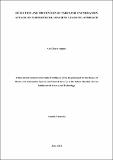Detection and prevention of username enumeration attack on SSH protocol: machine learning approach
Abstract
Over the last two decades (2000–2020), the Internet has rapidly evolved, resulting in
symmetrical and asymmetrical Internet consumption patterns and billions of users worldwide.
With the immense rise of the Internet, attacks and malicious behaviors pose a huge threat to
our computing environment. Brute-force attack is among the most prominent and commonly
used attacks, achieved out using password-attack tools, a wordlist dictionary, and a usernames
list – obtained through a so – called an enumeration attack. In this study, we investigate
username enumeration attack detection on SSH protocol by using machine-learning classifiers.
We apply four asymmetrical classifiers on our generated dataset collected from a closed environment network to build machine-learning-based models for attack detection. The use of
several machine-learners offers a wider investigation spectrum of the classifiers’ ability in
attack detection. Additionally, we investigate how beneficial it is to include or exclude network
ports information as features-set in the process of learning. We evaluated and compared the
performances of machine-learning models for both cases. The models used are k-nearest
neighbor (KNN), naïve Bayes (NB), random forest (RF) and decision tree (DT) with and
without ports information. Our results show that machine-learning approaches to detect SSH
username enumeration attacks were quite successful, with KNN having an accuracy of 99.93%,
NB 95.70%, RF 99.92%, and DT 99.88%. Furthermore, the results improved when using ports
information. The best selected model was then deployed into intrusion detection and prevention
system (IDS/IPS) to automatically detect and prevent username enumeration attack. Study also
recommends the use of Deep Learning in future studies.

